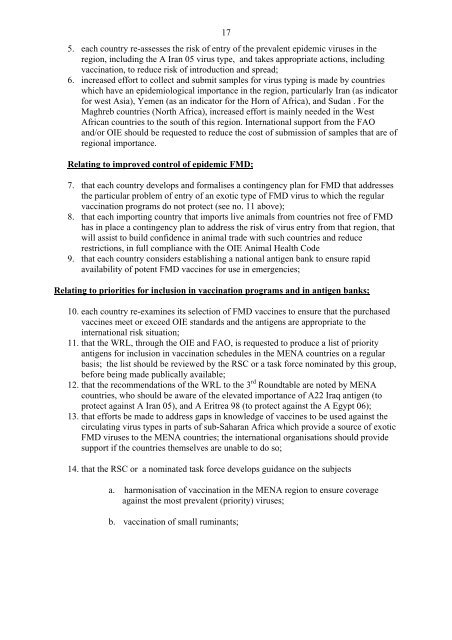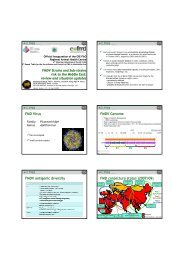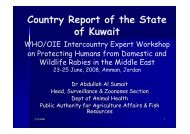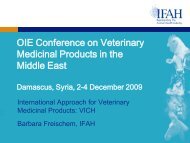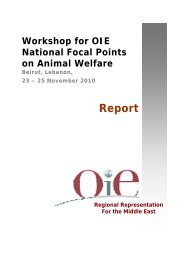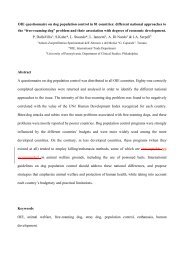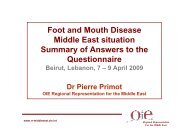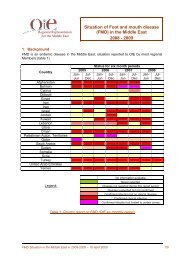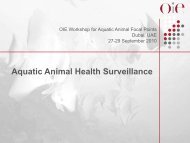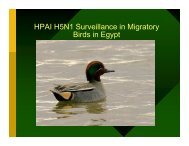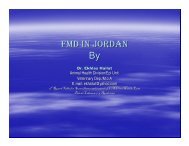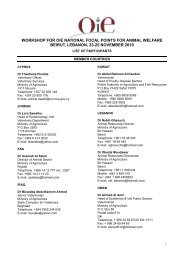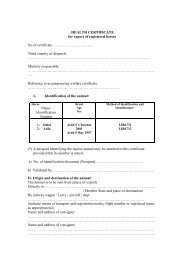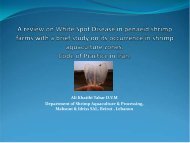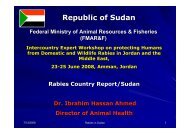Recommends that:16Relat<strong>in</strong>g <strong>to</strong> control of <strong>FMD</strong> <strong>in</strong> <strong>ME</strong>NA region;1. The whole of <strong>the</strong> <strong>Middle</strong> <strong>East</strong> <strong>and</strong> North Africa areas should be considered as one<strong>FMD</strong> epidemiological region, but with possible subregions reflect<strong>in</strong>g differentecosystems for circulation of <strong>FMD</strong>V stra<strong>in</strong>s, requir<strong>in</strong>g a set of co-coord<strong>in</strong>atedprevention, control <strong>and</strong> eradication programs <strong>to</strong> be elaborated cover<strong>in</strong>g <strong>the</strong> entireregion at risk;2. Transparency <strong>in</strong> notification of <strong>FMD</strong> outbreaks should be strongly implementedwith<strong>in</strong> <strong>the</strong> region <strong>to</strong> assist an effective response <strong>and</strong> control of <strong>FMD</strong>;3. <strong>FMD</strong> suspected samples <strong>to</strong> be sent <strong>to</strong> <strong>the</strong> <strong>in</strong>ternational reference labora<strong>to</strong>ries should beaccompanied a comprehensive epidemiological report, <strong>in</strong>clud<strong>in</strong>g <strong>the</strong> georeference,<strong>to</strong> assist early warn<strong>in</strong>g <strong>and</strong> trac<strong>in</strong>g <strong>the</strong> likely pattern of disease spread,4. Coord<strong>in</strong>ated action across borders <strong>and</strong> sanitary measures should be streng<strong>the</strong>ned byimpos<strong>in</strong>g appropriate quarant<strong>in</strong>e measures on animal movements whenever <strong>the</strong>disease is reported;5. systematic vacc<strong>in</strong>ation campaigns of rum<strong>in</strong>ants should be encouraged <strong>in</strong> all areas atrisk, especially <strong>in</strong> border areas, that are designed <strong>to</strong> reach a population immunity thatwill effectively prevent <strong>FMD</strong> spread, us<strong>in</strong>g appropriate vacc<strong>in</strong>es that meet<strong>in</strong>ternational st<strong>and</strong>ards; Procurement of vacc<strong>in</strong>es should consider <strong>the</strong> recent <strong>FMD</strong>Vantigenic subtypes <strong>in</strong> <strong>the</strong> countries of <strong>the</strong> region as well as <strong>the</strong> antigenic relationships<strong>to</strong> <strong>the</strong> virus isolates circulat<strong>in</strong>g <strong>in</strong> neighbor<strong>in</strong>g countries;6. A strategy <strong>to</strong> achieve <strong>in</strong>ternational recognized disease free zones or <strong>FMD</strong> free countrystatus must be developed <strong>in</strong> <strong>the</strong> region, with<strong>in</strong> <strong>the</strong> framework of <strong>the</strong> progressivecontrol of transboundary animal disease program (GF-TADs);7. <strong>in</strong> support of <strong>the</strong> above, each country is encouraged <strong>to</strong> “map” <strong>the</strong>ir rum<strong>in</strong>ant lives<strong>to</strong>ckpopulation <strong>in</strong> <strong>the</strong> country, <strong>and</strong> consideration should be given <strong>to</strong> develop<strong>in</strong>g a st<strong>and</strong>ardformat for lives<strong>to</strong>ck population mapp<strong>in</strong>g that is applicable across <strong>the</strong> region, <strong>and</strong>which will assist each country <strong>in</strong> plann<strong>in</strong>g disease control measures;8. The countries of <strong>the</strong> region establish an <strong>FMD</strong>V network, co-coord<strong>in</strong>ated by <strong>the</strong>Regional Animal Health Center (RAHC), <strong>to</strong> facilitate exchange of <strong>in</strong>formation <strong>and</strong> <strong>to</strong>respond rapidly <strong>to</strong> a emergence of any new serotype <strong>in</strong> <strong>the</strong> region;9. Member Countries of <strong>the</strong> <strong>Middle</strong> <strong>East</strong> region are urged <strong>to</strong> develop, test <strong>and</strong> keep aregularly updated a national foot <strong>and</strong> mouth disease preparedness plan that will assist<strong>the</strong>m <strong>to</strong> ensure a rapid <strong>and</strong> effective response <strong>to</strong> new epidemic events;.Relat<strong>in</strong>g <strong>to</strong> early warn<strong>in</strong>g of <strong>FMD</strong> risk <strong>in</strong> <strong>the</strong> <strong>ME</strong>NA region;1. <strong>the</strong> <strong>in</strong>formation flow <strong>to</strong> <strong>ME</strong>NA countries on <strong>the</strong> change <strong>in</strong> <strong>FMD</strong> risk should beimproved, with regular summaries of <strong>the</strong> situation <strong>and</strong> alerts with follow ups whenmajor events occur that threaten parts of <strong>the</strong> region;2. each country ensures that epidemiologically significant events are detected, actedupon <strong>and</strong> reported without delay; early recognition of <strong>the</strong>se events can be helped byus<strong>in</strong>g DEFINITIONS of abnormal field <strong>and</strong> labora<strong>to</strong>ry f<strong>in</strong>d<strong>in</strong>gs, such as <strong>in</strong>creased<strong>in</strong>cidence of <strong>FMD</strong>, <strong>the</strong> detection of a new subtype, or possible breakthrough of <strong>FMD</strong><strong>in</strong> well vacc<strong>in</strong>ated herds;3. when threaten<strong>in</strong>g events of regional significance are identified, emergency meet<strong>in</strong>gsbe rapidly convened by <strong>the</strong> RSC <strong>to</strong> assess <strong>the</strong> risk <strong>and</strong> necessary <strong>in</strong>ternationalresponse;4. <strong>the</strong> Regional Steer<strong>in</strong>g Committee of GF-TADS organise regular roundtable meet<strong>in</strong>gson <strong>FMD</strong> prevention <strong>and</strong> control, at least at yearly basis;
175. each country re-assesses <strong>the</strong> risk of entry of <strong>the</strong> prevalent epidemic viruses <strong>in</strong> <strong>the</strong>region, <strong>in</strong>clud<strong>in</strong>g <strong>the</strong> A Iran 05 virus type, <strong>and</strong> takes appropriate actions, <strong>in</strong>clud<strong>in</strong>gvacc<strong>in</strong>ation, <strong>to</strong> reduce risk of <strong>in</strong>troduction <strong>and</strong> spread;6. <strong>in</strong>creased effort <strong>to</strong> collect <strong>and</strong> submit samples for virus typ<strong>in</strong>g is made by countrieswhich have an epidemiological importance <strong>in</strong> <strong>the</strong> region, particularly Iran (as <strong>in</strong>dica<strong>to</strong>rfor west Asia), Yemen (as an <strong>in</strong>dica<strong>to</strong>r for <strong>the</strong> Horn of Africa), <strong>and</strong> Sudan . For <strong>the</strong>Maghreb countries (North Africa), <strong>in</strong>creased effort is ma<strong>in</strong>ly needed <strong>in</strong> <strong>the</strong> WestAfrican countries <strong>to</strong> <strong>the</strong> south of this region. International support from <strong>the</strong> FAO<strong>and</strong>/or <strong>OIE</strong> should be requested <strong>to</strong> reduce <strong>the</strong> cost of submission of samples that are ofregional importance.Relat<strong>in</strong>g <strong>to</strong> improved control of epidemic <strong>FMD</strong>;7. that each country develops <strong>and</strong> formalises a cont<strong>in</strong>gency plan for <strong>FMD</strong> that addresses<strong>the</strong> particular problem of entry of an exotic type of <strong>FMD</strong> virus <strong>to</strong> which <strong>the</strong> regularvacc<strong>in</strong>ation programs do not protect (see no. 11 above);8. that each import<strong>in</strong>g country that imports live animals from countries not free of <strong>FMD</strong>has <strong>in</strong> place a cont<strong>in</strong>gency plan <strong>to</strong> address <strong>the</strong> risk of virus entry from that region, thatwill assist <strong>to</strong> build confidence <strong>in</strong> animal trade with such countries <strong>and</strong> reducerestrictions, <strong>in</strong> full compliance with <strong>the</strong> <strong>OIE</strong> Animal Health Code9. that each country considers establish<strong>in</strong>g a national antigen bank <strong>to</strong> ensure rapidavailability of potent <strong>FMD</strong> vacc<strong>in</strong>es for use <strong>in</strong> emergencies;Relat<strong>in</strong>g <strong>to</strong> priorities for <strong>in</strong>clusion <strong>in</strong> vacc<strong>in</strong>ation programs <strong>and</strong> <strong>in</strong> antigen banks;10. each country re-exam<strong>in</strong>es its selection of <strong>FMD</strong> vacc<strong>in</strong>es <strong>to</strong> ensure that <strong>the</strong> purchasedvacc<strong>in</strong>es meet or exceed <strong>OIE</strong> st<strong>and</strong>ards <strong>and</strong> <strong>the</strong> antigens are appropriate <strong>to</strong> <strong>the</strong><strong>in</strong>ternational risk situation;11. that <strong>the</strong> WRL, through <strong>the</strong> <strong>OIE</strong> <strong>and</strong> FAO, is requested <strong>to</strong> produce a list of priorityantigens for <strong>in</strong>clusion <strong>in</strong> vacc<strong>in</strong>ation schedules <strong>in</strong> <strong>the</strong> <strong>ME</strong>NA countries on a regularbasis; <strong>the</strong> list should be reviewed by <strong>the</strong> RSC or a task force nom<strong>in</strong>ated by this group,before be<strong>in</strong>g made publically available;12. that <strong>the</strong> recommendations of <strong>the</strong> WRL <strong>to</strong> <strong>the</strong> 3 rd Roundtable are noted by <strong>ME</strong>NAcountries, who should be aware of <strong>the</strong> elevated importance of A22 Iraq antigen (<strong>to</strong>protect aga<strong>in</strong>st A Iran 05), <strong>and</strong> A Eritrea 98 (<strong>to</strong> protect aga<strong>in</strong>st <strong>the</strong> A Egypt 06);13. that efforts be made <strong>to</strong> address gaps <strong>in</strong> knowledge of vacc<strong>in</strong>es <strong>to</strong> be used aga<strong>in</strong>st <strong>the</strong>circulat<strong>in</strong>g virus types <strong>in</strong> parts of sub-Saharan Africa which provide a source of exotic<strong>FMD</strong> viruses <strong>to</strong> <strong>the</strong> <strong>ME</strong>NA countries; <strong>the</strong> <strong>in</strong>ternational organisations should providesupport if <strong>the</strong> countries <strong>the</strong>mselves are unable <strong>to</strong> do so;14. that <strong>the</strong> RSC or a nom<strong>in</strong>ated task force develops guidance on <strong>the</strong> subjectsa. harmonisation of vacc<strong>in</strong>ation <strong>in</strong> <strong>the</strong> <strong>ME</strong>NA region <strong>to</strong> ensure coverageaga<strong>in</strong>st <strong>the</strong> most prevalent (priority) viruses;b. vacc<strong>in</strong>ation of small rum<strong>in</strong>ants;


